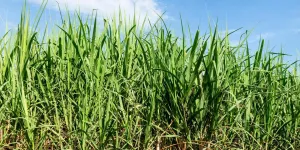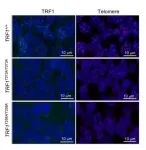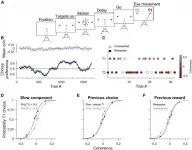Are 'bacterial probiotics' a game-changer for the biofuels industry?
2021-03-10
(Press-News.org) In a study recently published in Nature Communications, scientists from The Novo Nordisk Foundation Center for Biosustainability (DTU) and Yale University have investigated how bacteria that are commonly found in sugarcane ethanol fermentation affect the industrial process. By closely studying the interactions between yeast and bacteria, it is suggested that the industry could improve both its total yield and the cost of the fermentation processes by paying more attention to the diversity of the microbial communities and choosing between good and bad bacteria.
The scientists dissected yeast-bacteria interactions in sugarcane ethanol fermentation by reconstituting every possible combination of the microbial community structure, covering approximately 80% of the biodiversity found in industrial processes, and especially one bacterium deserves extra attention: Lactobacillus amylovorus. But how come exactly this one doesn't fall into the category of "the bad guys"? The main reason is that it produces a lot of the molecule acetaldehyde, which is used to feed yeast and thus helps it to grow. You could say that Lactobacillus amylovorus is more generous by nature and shares the meal, whereas many other bacteria involved in these processes prefer simply to steal the food.
"It works almost in the same way as a probiotic that shields the bad bacteria from entering into the system. And when this bacterium grows, it will grow in a way that is almost symbiotic with the yeast which is very beneficial for the industrial process", says Felipe Lino, former PhD Student at The Novo Nordisk Foundation Center for Biosustainability and Global R & D Manager at Anheuser-Busch InBev.
Significant improvement of yield
Thus, companies could take advantage of selecting not only for an ideal yeast strain for production, as they started doing already in the 90's, but to select for the best-suited bacteria as well, since it is completely impossible to get rid of bacteria that are hanging around no matter what. An effort that could turn out to pay dividends already in a short-term perspective.
By using this probiotic in a sugarcane ethanol fermentation, it is estimated that the fermentation yield could increase by three percent. While three percent can sound like a rather low number this is definitely not the case. According to Brazil's Biofuels Annual 2019, Brazil's total ethanol production in 2019 was 34.5 billion liters with domestic demand for 34 billion liters making the country the home to the largest fleet of cars that use ethanol derived from sugarcane as an alternative fuel to fossil fuel-based petroleum.
These numbers indicate that optimised fermentation processes hold great potential. One way to start ensuring more efficient industrial production of ethanol would be to apply more targeted approaches and shift away from a "one-size fits all" strategy where sulfuric acid treatment is used without further consideration to lower the pH and kill the bacteria to keep the population under a certain threshold. This would be beneficial both economically and environmentally, says Morten Sommer, Professor and Group Leader at The Novo Nordisk Foundation Center for Biosustainability.
"Instead of using a broad range of antibiotics, one should go for a more specific solution where you keep the good bacteria inside the fermenter. This is definitely a paradigm shift because you are not per definition fighting against all bacteria, since some of the bacteria are actually good and improve your final output significantly while also having a positive effect on production costs and the environmental footprint."
INFORMATION:
[Attachments] See images for this press release:

ELSE PRESS RELEASES FROM THIS DATE:
2021-03-10
Fuel cells, which are attracting attention as an eco-friendly energy source, obtain electricity and heat simultaneously through the reverse reaction of water electrolysis. Therefore, the catalyst that enhances the reaction efficiency is directly connected to the performance of the fuel cell. To this, a POSTECH-UNIST joint research team has taken a step closer to developing high-performance catalysts by uncovering the ex-solution and phase transition phenomena at the atomic level for the first time.
A joint research team of Professor Jeong Woo Han and Ph.D. candidate Kyeounghak Kim of POSTECH's Department of Chemical Engineering, and Professor Guntae Kim of UNIST have uncovered the mechanism by which PBMO - a catalyst used ...
2021-03-10
Italian and Russian researchers confirmed the hypothesis that the self-maintaining order in eukaryotic cells (cells with nuclei) is a result of two spontaneous mechanisms' collaboration. Similar molecules gather into 'drops' on the membrane and then leave it as tiny vesicles enriched by the collected molecules. The paper with the research results was published in the journal Physical Review Letters.
The research was carried out by an international interdisciplinary team of biologists (from Polytechnic University of Turin, Italian Institute for Genomic Medicine of the University of Turin and Candiolo Cancer Institute) and ...
2021-03-10
Variant B.1.1.7 of COVID-19 associated with a significantly higher mortality rate, research shows
The highly infectious variant of COVID-19 discovered in Kent, which swept across the UK last year before spreading worldwide, is between 30 and 100 per cent more deadly than previous strains, new analysis has shown.
A pivotal study, by epidemiologists from the Universities of Exeter and Bristol, has shown that the SARS-CoV-2 variant, B.1.1.7, is associated with a significantly higher mortality rate amongst adults diagnosed in the community compared to previously circulating strains.
The study compared death rates among people infected ...
2021-03-10
Newly published research has revealed a close link between proteins associated with Alzheimer's disease and age-related sight loss. The findings could open the way to new treatments for patients with deteriorating vision and through this study, the scientists believe they could reduce the need for using animals in future research into blinding conditions.
Amyloid beta (AB) proteins are the primary driver of Alzheimer's disease but also begin to collect in the retina as people get older. Donor eyes from patients who suffered from age-related macular degeneration (AMD), the most common cause of blindness amongst adults in the UK, have been shown to contain high levels of AB in their retinas.
This new study, published in the journal Cells, builds on previous ...
2021-03-10
The Telomeres and Telomerase Group led by Maria A. Blasco at the Spanish National Cancer Research Centre (CNIO) continues to make progress in unravelling the role that telomeres -the ends of chromosomes that are responsible for cellular ageing as they shorten- play in cancer. The CNIO team was among the first to propose that shelterins, proteins that wrap around telomeres and act as a protective shield, might be therapeutic targets for cancer treatment. Subsequently, they found that eliminating one of these shelterins, TRF1, blocks the initiation and progression of lung cancer and glioblastoma in mouse models and prevents glioblastoma stem cells from forming secondary tumours. Now, in a study published in PLOS Genetics, ...
2021-03-10
People with aphantasia - that is, the inability to visualise mental images - are harder to spook with scary stories, a new UNSW Sydney study shows.
The study, published today in Proceedings of the Royal Society B, tested how aphantasic people reacted to reading distressing scenarios, like being chased by a shark, falling off a cliff, or being in a plane that's about to crash.
The researchers were able to physically measure each participant's fear response by monitoring changing skin conductivity levels - in other words, how much the story made a person sweat. This type of test is commonly ...
2021-03-10
WESTMINSTER, Colorado - March 10, 2021 - The paperbark tree (Melaleuca quinquenervia) was introduced to the U.S. from Australia in the 1900s. Unfortunately, it went on to become a weedy invader that has dominated natural landscapes across southern Florida, including the fragile wetlands of the Everglades.
According to an article in the journal END ...
2021-03-10
ften, humans display biases, i.e., unconscious tendencies towards a type of decision. Despite decades of study, we are yet to discover why biases are so persistent in all types of decisions. "Biases can help us make better decisions when we use them correctly in an action that has previously given us great reward. However, in other cases, biases can play against us, such as when we repeat actions in situations when it would be better not to", says Rubén Moreno Bote, coordinator of the UPF Theoretical and Cognitive Neuroscience Laboratory.
In these cases, decisions are guided by tendencies, or inclinations, that do not benefit our wellbeing. For example, playing the lottery more regularly after winning ...
2021-03-10
Recent studies estimate that we use an astounding 129 billion face masks globally every month - that is 3 million a minute. Most of them are disposable face masks made from plastic microfibers.
- With increasing reports on inappropriate disposal of masks, it is urgent to recognize this potential environmental threat and prevent it from becoming the next plastic problem, researchers warn in a comment in the scientific journal Frontiers of Environmental Science & Engineering.
The researchers are Environmental Toxicologist Elvis Genbo Xu from University of Southern Denmark and Professor of Civil and Environmental Engineering ...
2021-03-10
Global targets to improve the welfare of people across the planet will have mixed impacts on the world's forests, according to new research.
The United Nations' 17 key areas for global development - known as the Sustainable Development Goals (SDGs) - range from tackling poverty, hunger and sanitation to promoting clean energy, economic growth and reducing inequality.
Many of these goals, such as improved peace and justice, good health and wellbeing, and quality education, will have a positive impact on the Earth's natural forests.
But others, including creating new roads, industry and infrastructure, ...
LAST 30 PRESS RELEASES:
[Press-News.org] Are 'bacterial probiotics' a game-changer for the biofuels industry?







